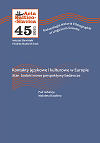Lingua receptiva: ekolingwistyczne ujęcie słowiańskich kontaktów międzyjęzykowych w przestrzeni pogranicza (przypadek polsko-czeski)
Lingua receptiva: An Ecolinguistic Approach to Slavic Inter-Language Contacts in a Borderland Area (a Polish-Czech Case)
Author(s): Magdalena SteciągSubject(s): Language studies, Applied Linguistics, Sociolinguistics, Western Slavic Languages
Published by: Instytut Slawistyki Polskiej Akademii Nauk
Keywords: lingua receptiva; lingua franca; ecolinguistics; inclusive multilingualism; Polish-Czech borderland;
Summary/Abstract: Ecolinguistics has dealt with inter-language contacts ever since its beginnings as an independent linguistic discipline in the 1970s. However, it has not gained much interest among Slavic studies scholars in Poland. The aim of this article is to present the ecolinguistic concept of research on Slavic inter-language contacts on the example of Polish and Czech using the notion lingua receptiva. The proposed concept of integrated research on language ecology in the Polish-Czech borderland covers three dimensions of the language ecosystem: natural, social and cognitive. Research on the natural ecology of the language revolves around its interrelationships with the surrounding natural environment and can relate to topography, fauna and flora, etc. This research considers the potential of the natural and the anthropogenic environment in relation to the language (and vice versa). In the sociological observation of the language ecology, attention is paid to social and cultural conditions shaping the relationships between communicating individuals and the nature of the communities that are constituted or maintained as a result of these contacts. Cognitive language ecology, in turn, includes the cognitive skills and competences of users, especially those that enable flexible adaptation in a particular environment. A different methodology has been developed for each dimension: from sociolinguistic quantitative approaches based on surveys, to pragmalinguistic experiments designed to observe the shape of sender-recipient relations in inter-language receptive communication. These methodologies are presented together with the preliminary results of research which make it possible to state that lingua receptiva is the nucleus of inclusive multilingualism, breaking the paradigm of monolingualism and blurring the borders between languages in the pursuit of mutual understanding.
Journal: Acta Baltico Slavica
- Issue Year: 2021
- Issue No: 45
- Page Range: 1-19
- Page Count: 19
- Language: Polish

